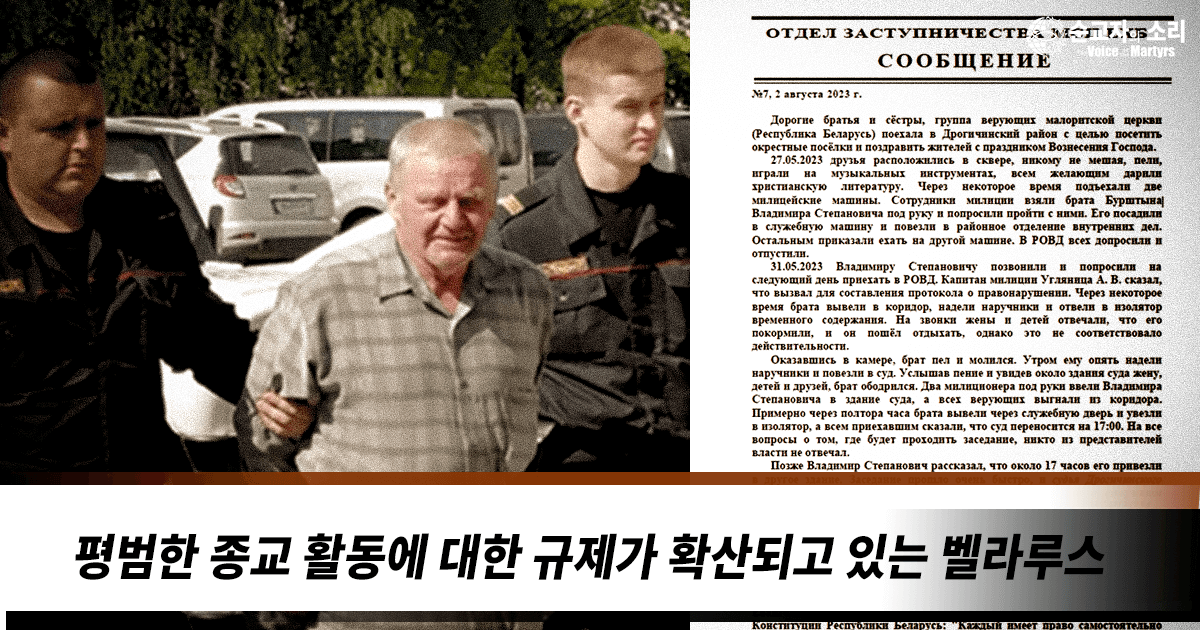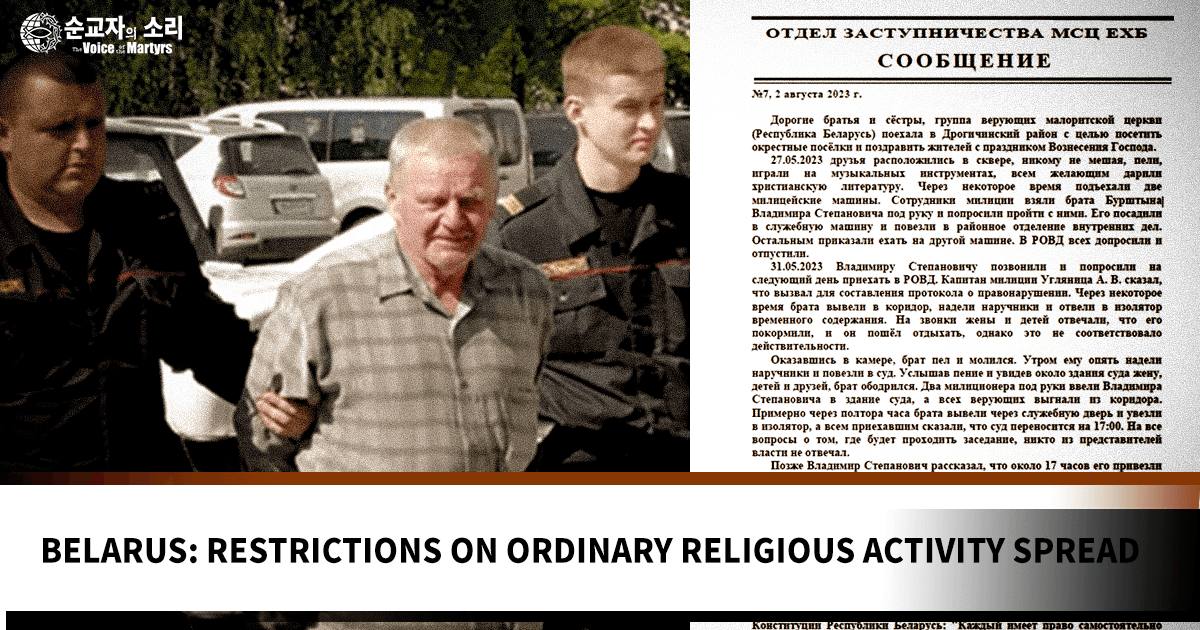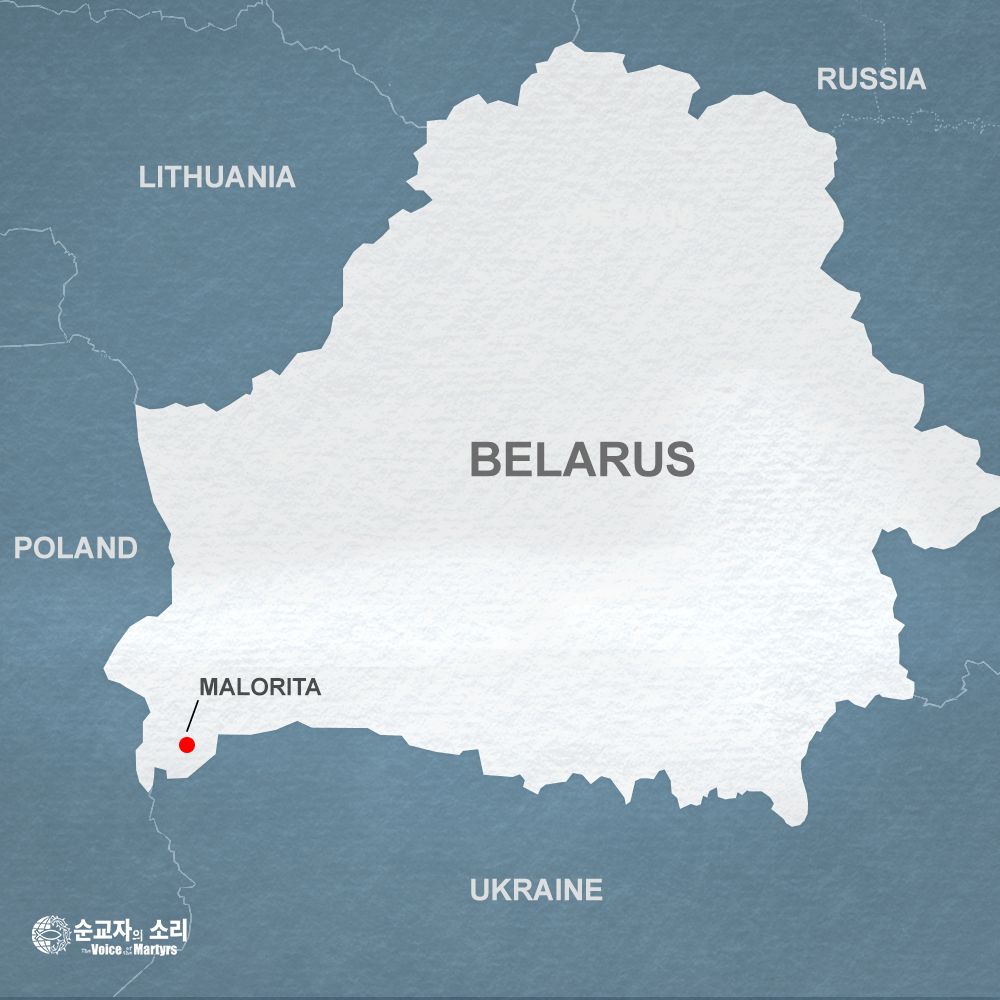
BELARUS: RESTRICTIONS ON ORDINARY RELIGIOUS ACTIVITY SPREAD

A man in his 70s was fined the equivalent of two weeks’ wages by authorities in Belarus for sharing the gospel at a local park in May. According to persecution ministry Voice of the Martyrs Korea, the guilty verdict delivered by the judge of the Drogichinsky district court against Vladimir Burshtyn of the Malorita Church is an example of the growing criminalization of ordinary religious activities by Belarus authorities.
“Mr. Burshtyn was part of a group of believers from his church that went to a park in the Drogichinsky district on May 27 for what was basically pretty small-scale street evangelism on the occasion of Ascension Day,” says Voice of the Martyrs Korea Representative Dr. Hyun Sook Foley. “The group was playing music and singing songs while handing out Christian materials. Suddenly two police cars drove up, took Mr. Burshtyn by the arms, put him into one of the police cars, and took him to the police station for questioning.”
According to Representative Foley, Mr. Burshtyn was released but then summoned to appear at the police station on June 1 for further questioning. “As the day went on, they told his family he was having dinner and some rest, when actually he had been handcuffed and taken away to a temporary detention facility, where he was held overnight,” says Representative Foley. “In the morning they led him into court in handcuffs.”

Witnesses say church and family members were barred from entering the courtroom, according to Representative Foley. “After about an hour and a half in the courtroom, Mr. Burshtyn was taken out via a service door to an isolation ward, and all those who asked were told that the trial had been postponed and moved,” says Representative Foley.
She says the trial reconvened in a police building later that day, and the judge quickly found Mr. Burshtyn guilty of holding a mass event without permission. “The court actually notified him by mail that he was fined 555 Belarusian rubles (about 290,000 KRW), the equivalent of about two weeks’ wages,” says Representative Foley. “But he did not receive the notification until after the date for possible appeal had passed.”
Representative Foley says that on July 27 authorities again summoned Mr. Burshtyn and warned that he would face criminal liability if he continued to preach in the future.
Despite all of the difficulties, Mr. Burshtyn continues to be in good spirits, according to Representative Foley. “When he spent the night in prison, he sang,” she says. “When he pleaded not guilty, he simply insisted that preaching the gospel was not a crime. When he left the police station after the trial, he was met by family and friends standing outside, who cheered and encouraged him.”

Vladimir Burshtyn is brought into court in handcuffs by police on June 2. (Photo courtesy of the Baptist Council of Churches via Forum18.)
According to Representative Foley, her organization is seeking to draw global attention to Mr. Burshtyn’s case precisely because it is so ordinary. “Reports by the UN and human rights watchdog groups highlight the high–profile cases of religious discrimination involving governments,” says Representative Foley. “But far more common—and in our opinion, far more concerning—are the growing number of much less well-known cases where ordinary Christians who are doing ordinary Christian activities end up fined or imprisoned by ordinary police and judges applying ordinary laws to stop them. That is exactly what has happened to Mr. Burshtyn.”
Representative Foley says authorities in Belarus and other countries that restrict religious activities often claim that the restrictions are not against religion but against individuals who they say ignore safety rules designed to protect the public. “They will say things like that Mr. Burshtyn should have gotten a permit ahead of time so that if there were medical emergencies at his event, then the authorities would have been ready to handle them,” says Representative Foley.
But she says that the actions by authorities show that their main concern is not public safety but instead restricting religion. “A concern for public safety does not explain why a 70-year-old street evangelist would be handcuffed, led away to a secret location, given a secret trial, and fined without possibility of appeal,” says Representative Foley.

Report # 7 from the Intercession department of Unregistered Baptists, issued on the case of Vladimir Burshtyn on August, 2, 2023.
Representative Foley says her organization is expecting that more believers in Belarus will face situations like Mr. Burshtyn’s in the future. “On June 2—the day Mr. Burshtyn was found guilty—a draft copy of new legislation on religion was made public on the government’s website,” says Representative Foley. She says that legislation will likely result in less legal protections for ordinary Christian activity and a growing likelihood that Mr. Burshtyn won’t be the last Belarusian led away in handcuffs for sharing the gospel.
Still, Representative Foley says she is encouraged by the faithful witness of Belarusian Christians. “We invited a Belarusian pastor to speak in Korea about the situation in Belarus several years ago, and he told us that the best situation for church growth is ‘something between freedom and persecution, the time of oppression.’ The time of oppression is now upon the Belarusian church, and even its 70-year-old men in handcuffs are boldly testifying for the gospel without fear in the prisons and courts of that nation. Church growth can’t be far behind.”
Individuals interested in learning more about Voice of the Martyrs Korea’s work with evangelical believers in the countries of the former Soviet Union can visit https://vomkorea.com/en/project/russia-ministry/.

